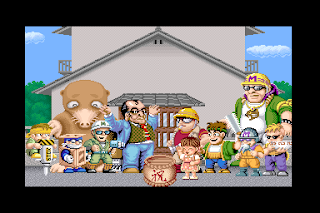In Hammerin' Harry, you play Harry, a plucky Japanese Everyman who gets his modest pad destroyed by greedy corporate bully-boys, the Rusty Nail Construction Company.





In this tricky era of economic downturn (my mate Paddy calls it 'the Pinch') it's worth remembering the equally devastating cost of national prosperity. The Japanese Post-War Economic Miracle was internationally lauded as a model example of what ingenuity and hard graft can achieve, but the ecological and sociological upheaval that came with it had far reaching, sometimes catastrophic consequences. The Chisso Corporation's poisoning of Minamata Bay was a particularly high-profile instance of this, but far more common were the petty injustices meted out to the average Japanese worker, who frequently endured low pay, punishingly long hours, unsafe working environments and cramped, insanitary housing. With real estate prices around major cities skyrocketing to become some of the highest in the world, unscrupulous construction companies had every incentive to use underhand tactics to evict residents sitting on prime turf.
While this was by no means a solely Japanese phenomenon - you've only got to look at something like Batteries Not Included to remember that the 'greedy developer' stereotype was globally ubiquitous during the late eighties and early nineties - Japan's role as trailblazer for the South East Asian Tiger Economies had been instrumental in its post-war restoration of national pride. With the American occupation's abolishing of militaristic State Shintoism, the fifties saw the resultant void filled with an explosion of New Religious Movements, their tenets often conflated with the ideologies of big corporations, with the CEO acting as a kind of cult leader.
By the end of the eighties, however, the Japanese economy was shifting away from the heavy industry of the fifties and sixties, towards a white-collar workforce. This increasingly prosperous, educated population had not experienced the privations of the previous generation, and - in response to several major domestic ecological catastrophes - had a strong environmentalist consciousness, making them particularly unsympathetic to the interests of large industrial conglomerates. It shouldn't be much of a surprise, then, to see that video games from around this period reflect the zeitgeist just as much as other artistic media. Games have a perceived lightness of touch that allows them to absorb and reinterpret cultural traumas. They're good at declawing disaster.
In any case, fortunately for Harry, the efforts of the little guy result in increased corporate responsibility, and everybody ultimately prospers (well, until the tech bubble pops seven years later). Here he is having triumphed over the final boss, Rusty Nail's plutocratic CEO, by walloping him multiple times in the face with a giant mallet:



Mercy
- Home Access Key : ( 1 )
- Portfolio Access Key : ( B )
- What We Do Access Key : ( 6 )
- Arts Access Key : ( 7 )
- Live Access Key : ( 8 )
- Publishing
- Workshops Access Key : ( 9 )
- Creative Collaborators Access Key : ( C )
- About Us Access Key : ( 2 )
- What we are up to Access Key : ( 3 )
- What we believe Access Key : ( 4 )
What we are up to
Video Games: A Cultural History - #4 Japan's Construction Boom In 'Hammerin' Harry'
0
KEYWORD
CATEGORY
- Agency 60
- Biennial Podcast 21
- E-Zine 15
- Flatline 9
- Friends 15
- Live 93
- My Gepetto 1
- News 102
- Press 5
- Publishing 15
- Shop 4
- Workshops 9